Dagstuhl-Seminar 20051
Computational Metabolomics: From Cheminformatics to Machine Learning
( 26. Jan – 31. Jan, 2020 )
Permalink
Organisatoren
- Sebastian Böcker (Universität Jena, DE)
- Corey Broeckling (Colorado State University - Fort Collins, US)
- Emma Schymanski (University of Luxembourg, LU)
- Nicola Zamboni (ETH Zürich, CH)
Kontakt
- Andreas Dolzmann (für wissenschaftliche Fragen)
- Annette Beyer (für administrative Fragen)
Impacts
- Dagstuhl Seminar on theFoundations of Composite Event Recognition : article - Artikis, Alexander; Eiter, Thomas; Margara, Alessandro - Piräus : University, 2020. - 4 pp..
- Empowering Large Chemical Knowledge Bases for Exposomics : Pubchemlite Meets Metfrag : article in review - Schymanski, Emma; Kondic, Todor; Thiessen , Paul; Zhang, Jian; Bolton, Evan; Neumann, Steffen - London : BMC, 2021. - 18 pp. - (Journal of Cheminformatics ; in review).
- MarkerDB : an online database of molecular biomarkers : article - Wishart, David S.; Budinski, Zachary; Berjanskii, Mark; Guo, AnChi; Cao, Xuan; Wilson, Michael; Liang, Kevin Y. H.; Oler, Eponine; Bartok. Brendan - Oxford : Oxford University Press, 2021. - 9 pp..
- Mining the NIST Mass Spectral Library Reveals the Extent of SodiumAssisted Inductive Cleavage in Collision-Induced Fragmentation : article - Ludwig, Marcus; Broeckling, Corey; Dorrestein, Pieter; Dührkop, Kai; Schymanski, Emma; Nothias, Louis-Felix; Böcker, Sebastia - chemRxiv, 2021. - 6 pp..
- patRoon : open source software platform for environmental mass spectrometry based non-target screening - Helmus, Rick; Laak, Thomas L. ter; Wezel, Annemarie P. van; Voogt, Pim de; Schymanski, Emma - London : BMC, 2021. - 25 pp - (Journal of Cheminformatics ; 13. 2021, 1).
- Retrospective Non-target Analysis to Support Regulatory Water Monitoring : From Masses of Interest to Recommendations via in silico workflows : article in review - Lai, Adelene; Singh , Randolph R.; Kovalova, Lubomira; Jaeggi, Oliver; Kondic, Todor; Schymanski, Emma - Berlin : Springer, 2021. - 29 pp. - (Environmental Sciences Europe ; in review).
- Studying Charge Migration Fragmentation of Sodiated Precursor Ions in Collision-Induced Dissociation at the Library Scale : article - Ludwig, Marcus; Broeckling, Corey; Dorrestein, Pieter ; Dührkop, Kai; Schymanski, Emma L.; Nothias, Louis-Felix; Böcker, Sebastian - Washington : ACS Publications, 2021. - pp. 180-186 - (Journal of the American Society for Mass Spectrometry ; 32. 2021, 1).
- Universal MS/MS Visualization and Retrieval with the Metabolomics Spectrum Resolver Web Service : article - Bittremieux, Wout; Chen, Christopher; Dorrestein, Pieter ; Schulze, Tobias; Wang, Mingxun; Rogers, Simon; Meier, Rene; Neumann, Steffen; Schymanski, Emma - bioRxiv, 2021. - 11 pp..
Mass spectrometry is the predominant analytical technique for detection, identification, and quantification in metabolomics experiments. Technological advances in mass spectrometry and experimental workflows during the last decade enabled novel investigations of biological systems on the metabolite level. Metabolomics started as the study of all metabolites in a living cell or organism; in comparison to transcriptome and proteome, the metabolome is a better proxy of metabolic activity. Emerging fields including personalized medicine and exposomics have expanded the scope of metabolomics to “all” small molecules, including those of non-biological origin. Advances in instrumentation plus rapid increase in popularity, throughput and desired compound coverage has resulted in vast amounts of both raw and processed data; the field is in desperate need for further developments in computational methods. Methods established in other -omics fields are frequently not transferable to metabolomics due to the structural diversity.
Close collaborations between experimental and computational scientists are developing, greatly supported through previous Dagstuhl Seminars on this topic (e.g. Seminars 15492 and 17491). Much progress has been made in the last decade, and the field has started to prosper. However, there are still many problems that we have to overcome. Firstly, there is the issue of parallel and compartmentalized scientific societies: Cross talk between “classical” cheminformatics and novel approaches from bioinformatics and machine learning need to be strengthened. Secondly, hurdles for entering the field are still very high, particularly for scientists from machine learning who do not want to invest time on issues such as data processing. Thirdly, it is difficult to establish and maintain scientific discussions and collaborations between experimentalists, chem/bioinformaticians and machine learners, as they “do not speak the same language”.
This seminar will concentrate on incorporating and bridging the diverse computational communities (experimentalists, cheminformatics, bioinformatics, machine learning), identifying obstacles and developing solutions and new/existing collaborations to overcome them.
Topics to be discussed may include, but are in no way limited to: workflows and strategies for annotation of whole metabolomes; metabolomics and systems biology; mining “expert knowledge”; combining genome and metabolome mining; cheminformatics approaches for partial identification and core structures; searching for novel compounds; retention time information; prediction of ionisation forms and response; separation and identification statistics; the future of untargeted metabolomics.
 Sebastian Böcker, Corey Broeckling, Emma Schymanski, and Nicola Zamboni
Sebastian Böcker, Corey Broeckling, Emma Schymanski, and Nicola Zamboni
Mass spectrometry is the predominant analytical technique for detection, identification, and quantification in metabolomics experiments. Technological advances in mass spectrometry and experimental workflows during the last decade enabled novel investigations of biological systems on the metabolite level. Metabolomics started as the study of all metabolites in a living cell or organism; in comparison to transcriptome and proteome, the metabolome is a better proxy of metabolic activity. Emerging fields including personalized medicine and exposomics have expanded the scope of metabolomics to “all” small molecules, including those of non-biological origin. Advances in instrumentation plus rapid increase in popularity, throughput and desired compound coverage has resulted in vast amounts of both raw and processed data; the field is in desperate need for further developments in computational methods. Methods established in other -omics fields are frequently not transferable to metabolomics due to the structural diversity of small molecules. This third Dagstuhl Seminar on Computational Metabolomics (following Seminars 15492 and 17491) focused on cheminformatics and machine learning. The seminar was less structured than previous seminars, forming break-out sessions already from Monday afternoon, then collecting participants back into plenary sessions at regular intervals for discussions and further topic exploration. The major topics launched on Monday included cheminformatics, genome mining and autoencoders, which were developed throughout the day. Other topics discussed throughout the week included biosynthesis and gene clusters, confidence and compound identification, spectral versus structural similarity, statistical integration, collision cross section (CCS) and ion mobility separation (IMS), benchmarking data, open feature file format, exposomics, data processing and acquisition. Several evening sessions were also held, including retention time, Bioschemas, MassBank, ethics and philosophy of software development, open biological pathways, mass spec health check, Jupyter notebooks, a mini decoy session and a session on coding tips. The excursion, breaking with previous Christmas Market traditions, was to the Völklingen steelworks. Finally, the entire seminar was wrapped up with a discussion on the future of untargeted metabolomics on Friday – time will tell what the future Computational Metabolomics Seminars will bring. A further seminar in the series may be considered for the end of 2021 or in 2022.
 Sebastian Böcker, Corey Broeckling, Emma Schymanski, and Nicola Zamboni
Sebastian Böcker, Corey Broeckling, Emma Schymanski, and Nicola Zamboni
- Oliver Alka (Universität Tübingen, DE)
- Nikiforos Alygizakis (Environmental Institute - Koš, SK)
- Sebastian Böcker (Universität Jena, DE) [dblp]
- Evan Bolton (National Institutes of Health - Bethesda, US) [dblp]
- Corey Broeckling (Colorado State University - Fort Collins, US) [dblp]
- Celine Brouard (INRA - Toulouse, FR) [dblp]
- Andrea Brunner (KWR Water Research Institute - Nieuwegein, NL)
- Jacques Corbeil (University Laval - Québec, CA) [dblp]
- Alexis Delabriere (ETH Zürich, CH)
- Pieter Dorrestein (University of California - San Diego, US) [dblp]
- Xiuxia Du (University of North Carolina - Charlotte, US)
- Timothy M. D. Ebbels (Imperial College London, GB) [dblp]
- Markus Fleischauer (Universität Jena, DE)
- Laurent Gatto (University of Louvain, BE) [dblp]
- Kati Hanhineva (University of Kuopio, FI)
- Rick Helmus (University of Amsterdam, NL)
- Lukas Käll (KTH Royal Institute of Technology - Solna, SE) [dblp]
- Oliver Kohlbacher (Universität Tübingen, DE) [dblp]
- Adelene Lai Shuen Lyn (University of Luxembourg, LU)
- Jan Lisec (BAM - Berlin, DE)
- Marcus Ludwig (Universität Jena, DE) [dblp]
- Tytus Mak (NIST - Gaithersburg, US)
- Hiroshi Mamitsuka (Kyoto University, JP) [dblp]
- Ewy A. Mathé (Ohio State University - Columbus, US) [dblp]
- Hunter Moseley (University of Kentucky - Lexington, US)
- Steffen Neumann (IPB - Halle, DE) [dblp]
- Louis-Felix Nothias (University of California - San Diego, US) [dblp]
- Jamie Nuñez (Pacific Northwest National Lab. - Richland, US) [dblp]
- Tomas Pluskal (Whitehead Institute - Cambridge, US) [dblp]
- Stacey N. Reinke (Edith Cowan University - Joondalup, AU)
- Simon Rogers (University of Glasgow, GB) [dblp]
- Juho Rousu (Aalto University, FI) [dblp]
- Augustin Scalbert (IARC - Lyon, FR) [dblp]
- Tobias Schulze (UFZ - Leipzig, DE)
- Emma Schymanski (University of Luxembourg, LU) [dblp]
- Christoph Steinbeck (Universität Jena, DE) [dblp]
- Michael Andrej Stravs (Eawag - Dübendorf, CH)
- Justin J. J. van der Hooft (Wageningen University, NL) [dblp]
- Philip Wenig (Lablicate - Hamburg, DE) [dblp]
- Egon Willighagen (Maastricht University, NL) [dblp]
- David Wishart (University of Alberta - Edmonton, CA) [dblp]
- Michael Anton Witting (Helmholtz Zentrum - München, DE) [dblp]
- Oscar Yanes (Rovira i Virgili University - Reus, ES)
- Nicola Zamboni (ETH Zürich, CH) [dblp]
Verwandte Seminare
- Dagstuhl-Seminar 15492: Computational Metabolomics (2015-11-29 - 2015-12-04) (Details)
- Dagstuhl-Seminar 17491: Computational Metabolomics: Identification, Interpretation, Imaging (2017-12-03 - 2017-12-08) (Details)
- Dagstuhl-Seminar 22181: Computational Metabolomics: From Spectra to Knowledge (2022-05-01 - 2022-05-06) (Details)
- Dagstuhl-Seminar 24181: Computational Metabolomics: Towards Molecules, Models, and their Meaning (2024-04-28 - 2024-05-03) (Details)
- Dagstuhl-Seminar 26181: Computational Metabolomics: Discovery of New Molecules to Actionable Insights (2026-04-26 - 2026-04-30) (Details)
Klassifikation
- artificial intelligence / robotics
- bioinformatics
Schlagworte
- Computational metabolomics
- computational mass spectrometry
- bioinformatics
- chemoinformatics
- machine learning

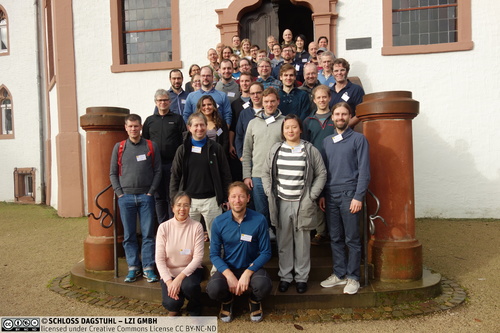
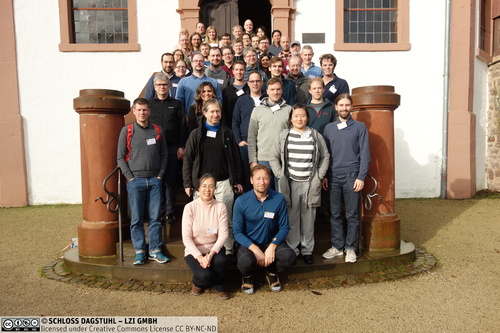
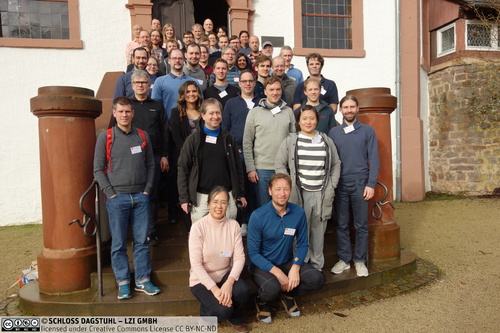
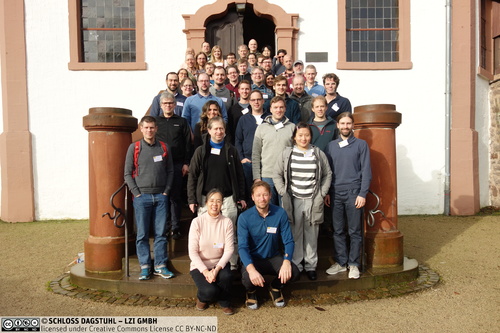
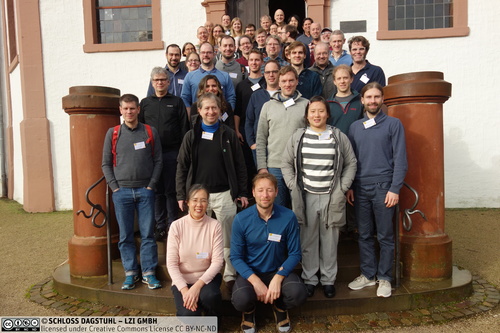
 Creative Commons BY 3.0 DE
Creative Commons BY 3.0 DE
